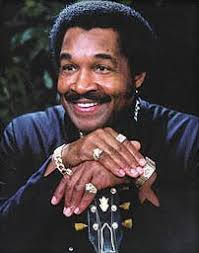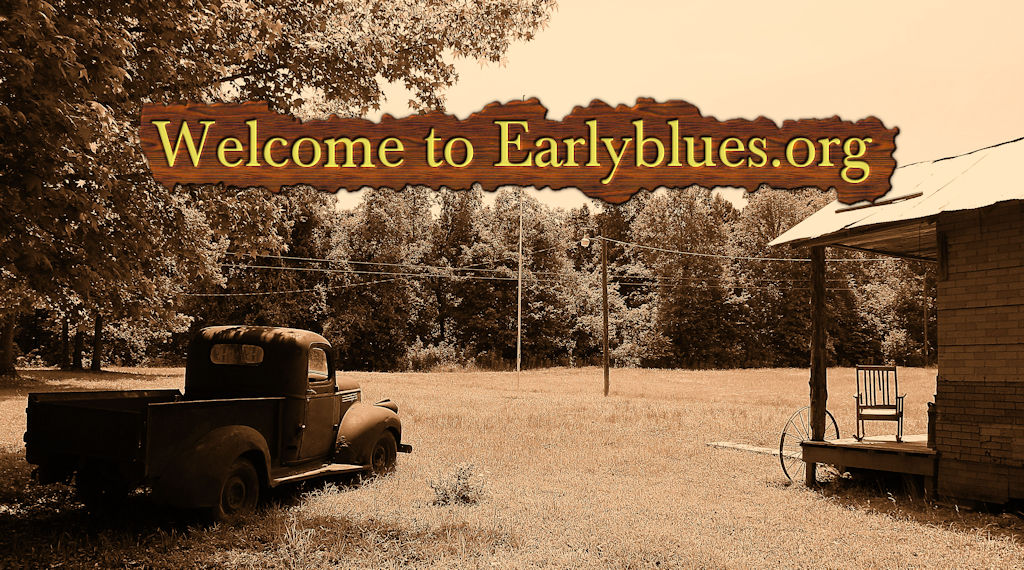‘Little Milton Obituary’ – by Keith Woods, from Tales From The Woods
 Raise a final sad glass to blues/soul guitarist, singer, songwriter Little Milton who died on the 5th August 2005, nine days after suffering a massive stroke in his adopted hometown of Memphis, Tennessee aged 71.
Raise a final sad glass to blues/soul guitarist, singer, songwriter Little Milton who died on the 5th August 2005, nine days after suffering a massive stroke in his adopted hometown of Memphis, Tennessee aged 71.
I was lucky enough to witness Little Milton in action just twice, the events being a considerable number of years apart. Quality of performance? Well, simply a comparison could never be drawn between the two gigs.
The first, headlining a small blues package at The Mean Fiddler in its original home of Harlesden, Northwest London in company with Denise La Salle and Latimore. Disappointingly attended, there was plenty of room down at the front. The whole show was wonderful and, when Milton stopped stage front, he looked and sounded fantastic, at the top of his game, a master of his craft. A decade or so later, at the Utrecht Blues Festival, perched upon a stool which magically allowed him to stay in a semi upright position. To say he was drunk would be an understatement; his band master desperately fighting a losing battle to hold the whole gig together.
Hardly a fitting memory to go out on, bearing in mind Milton has, for many a long year, been recognised by his peers as a first rate soul and blues man, often described as being somewhere between B B King and Bobby ‘Blue’ Bland, a voice that takes in influences of immediate post-war names such as Charles Brown, his long career spanned more than a fair share of legendary labels… Trumpet, Sun, Chess/Checker, Stax and Malaco.
He provided the blues with a couple of chestnuts which every aspiring blues guitarist, good, bad or indifferent, will no doubt play in tiny, smoky back rooms and village halls wherever in the world the blues has an audience ‘Grits And Groceries’ and, 20 years or so later, ‘The Blues Is Alright’. Some magnificent tracks, second to none in the opinion of this lowly ‘TFTW’ editor/scribe… ‘If Walls Could Talk’, ‘We’re Gonna Make It’, ‘Who’s Cheating Who?’ to name but three.
Born James Milton Campbell on the 7th September 1934 in Inverness, Mississippi, according to some accounts the ‘Little’ handle was 6 used to differentiate him from his father, Big Milton, a farmer and local performer around Greenville, Mississippi. Making his first appearances as a teenager in the blues bars and cafés along Greenville’s then very much celebrated Nelson Street, his first recordings were made in the very early 1950 accompanying pianist Willie Love and then, under his own name, on three singles on Sam Phillips’ Sun label under the guidance of Ike Turner. Frustrated by his lack of success the young musician split Memphis for St Louis and cut tracks for Bobbin records which would soon be distributed by Chicago’s legendary Chess label.
Allegedly, Milton also worked for the A & R man and was responsible for the signings of Albert King and Fontella Bass. It was after signing to Chess’ sister label Checker that his career began to flourish. He started placing hits on the R&B charts around 1962 which he repeated right up to 1976 by which time he had placed 18 records on the Black Singles Top 40. The aforementioned ‘We’re Gonna Make It’ reached number one in 1965 and even made 25 on the pop charts Stateside.
He remained with Chess until 1971 before switching to Stax where ‘That’s What Love Will Do’ found him in the charts with a different label. Sadly repetition would prove elusive for him in the years ahead. Despite an appearance in the pivotal ‘Wattstax’ film, a series of ill-fitting funk releases throughout the remainder of the seventies certainly did little to help.
Malaco, the Jackson, Mississippi label that has kept Southern soul music alive for almost three decades, rescued Little Milton and it became his home for 18 years, rewarded by his excellent contemporary material for the label like B B King, Bobby ‘Blue’ Bland and T Bone Walker before them, artists in comparison of which Milton has been considered. He was an avid touring act and made one of his final appearances in May 2005 on a bill with The Allman Brothers. In 1988 James ‘Little Milton’ Campbell won the W C Handy Award as the blues entertainer of the year and was inducted into the Blues Hall of Fame.
I hope my obituary meets with the approval of the ‘Tales From The Woods’ resident genius on all things soul, John ‘Soulboy’ Jolliffe no less. Oh, by the way, I reckon the title of a 1983 Little Milton album just about sums up everything that many of us here at ‘Tales From The Woods’ are all about… ‘Age Ain’t Nuthin’ But A Number’.
Keith Woods
Wikipedia Entry:
James Milton Campbell Jr. (September 7, 1934 – August 4, 2005), better known as Little Milton, was an American blues singer and guitarist, best known for his hit records “Grits Ain’t Groceries,” “Walking the Back Streets and Crying,” and “We’re Gonna Make It.”
Milton was born James Milton Campbell Jr., in the Mississippi Delta town of Inverness and raised in Greenville by a farmer and local blues musician. By age twelve he was a street musician, chiefly influenced by T-Bone Walker and his blues and rock and roll contemporaries. He joined the Rhythm Aces in the early part of the 1950s, a three piece band who played throughout the Mississippi Delta area. One of the members was Eddie Cusic who taught Milton to play the guitar. In 1951, Milton recorded several sides backing pianist Willie Love for Trumpet Records.
In 1953, while still a teenager playing in local bars, he caught the attention of Ike Turner, who was at that time a talent scout for Sam Phillips at Sun Records. Milton signed a contract with the label and recorded a number of singles. None of them broke through onto radio or sold well at record stores, however, and Milton left the Sun label by 1955. The next two years he released singles on Modern Records’s subsidiary, Meteor Records.
In 1958, Milton moved to he moved to East St. Louis and set up the St. Louis-based Bobbin Records label, which ultimately scored a distribution deal with Leonard Chess’ Chess Records. As a record producer, Milton helped bring artists such as Albert King and Fontella Bass to fame, while experiencing his own success for the first time. After a number of small format and regional hits, his 1962 single, “So Mean to Me,” broke onto the Billboard R&B chart, eventually peaking at #14.
Following a short break to tour, managing other acts, and spending time recording new material, he returned to music in 1965 with a more polished sound, similar to that of B.B. King. After the ill-received “Blind Man” (R&B: #86), he released back-to-back hit singles. The first, “We’re Gonna Make It,” a blues-infused soul song, topped the R&B chart and broke through onto Top 40 radio, a format then dominated largely by white artists. He followed the song with #4 R&B hit “Who’s Cheating Who?” All three songs were featured on his album, We’re Gonna Make It, released that summer.
Milton’s song “Let Me Down Easy” was recorded by the Spencer Davis Group on The Second Album (1965), but his authorship was not acknowledged on the record. He released a single of it himself in 1968 on Checker. It was also chosen by Etta James as the final track in her final album The Dreamer in 2011.
Throughout the late 1960s Milton released a number of moderately successful singles, but did not issue a further album until 1969, with Grits Ain’t Groceries featuring his hit of the same name, as well as “Just a Little Bit” and “Baby, I Love You”. With the death of Leonard Chess the same year, Milton’s distributor, Checker Records fell into disarray, and Milton joined the Stax label two years later. Adding complex orchestration to his works, Milton scored hits with “That’s What Love Will Make You Do” and “What It Is” from his live album, What It Is: Live at Montreux. He appeared in the documentary film, Wattstax, which was released in 1973. Stax, however, had been losing money since late in the previous decade and was forced into bankruptcy in 1975.
After leaving Stax, Milton struggled to maintain a career, moving first to Evidence, then the MCA imprint Mobile Fidelity Records, before finding a home at the independent record label, Malaco Records, where he remained for much of the remainder of his career. His last hit single, “Age Ain’t Nothin’ But a Number,” was released in 1983 from the album of the same name. In 1988, Milton was inducted into the Blues Hall of Fame and won a W.C. Handy Award. His final album, Think of Me, was released in May 2005 on the Telarc imprint, and included writing and guitar on three songs by Peter Shoulder of the UK-based blues-rock trio Winterville.
Milton died on August 4, 2005 from complications following a stroke. He was 70. He was posthumously honored with a marker on the Mississippi Blues Trail.
On June 25, 2019, The New York Times Magazine listed Little Milton among hundreds of artists whose material was reportedly destroyed in the 2008 Universal fire.

